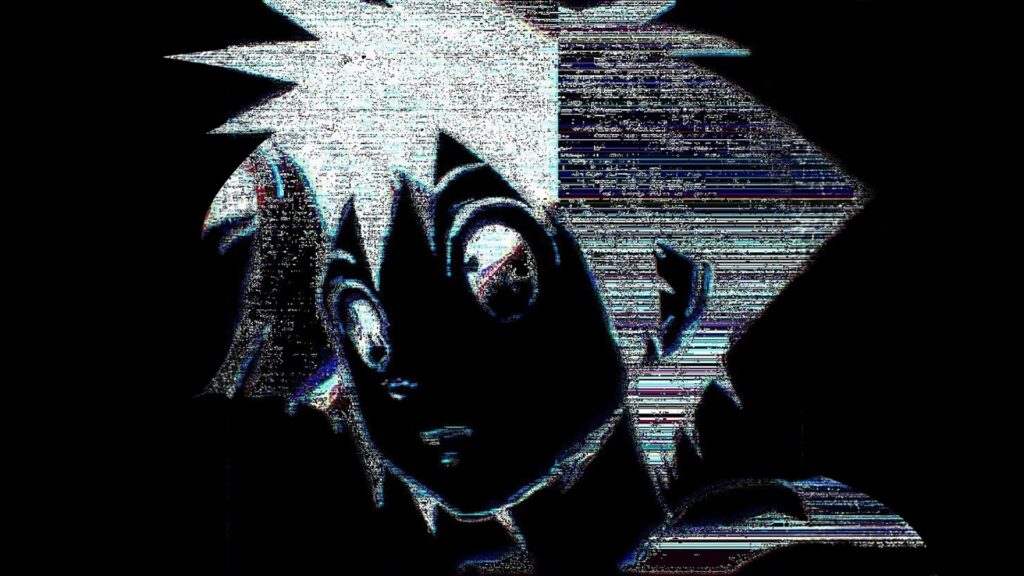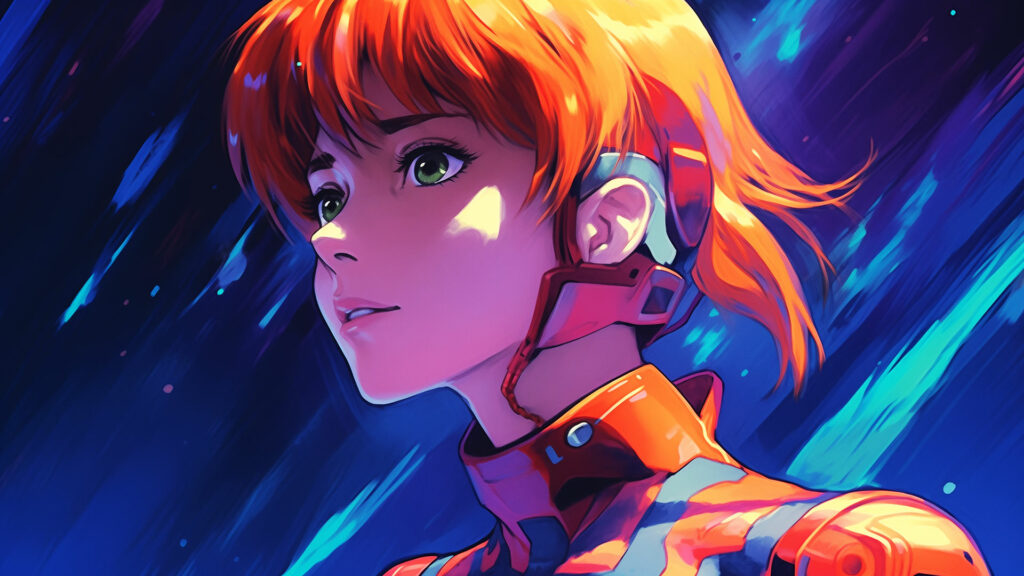‘Ren is the Promised Child, chosen by the Goddess to save the world from the forces of darkness. But nobody expected that this quest would transcend the boundaries between universes and bring a new understanding of the fabric of reality itself.’ Described on Steam as an ‘experimental philosophical narrative RPG’, Alex Mazey talks to yo252yo about their new indie game, Ren’s Demons.
I always feel the need to congratulate a game developer when they have me looking for a Bic Crystal, have me jotting down a few simple notes in order to solve a puzzle. Sure – I could open Notepad on my laptop; but the physicality of leaving the screen in order to find pen and paper felt nostalgic in a world where no one is required to do this anymore. Maybe it is presumptuous to say many video games are today made by people who do not play video games. This is not to hate on those games necessarily but to highlight how a certain type of game can feel soulless despite having the most beautifully designed environments. I know it might upset some people but a prescient example of that for me, at least, was a game like The Last of Us, which was clearly artistic – flawless even – in terms of story, worldbuilding, and design, but at the same time felt deeply contrived in other areas as they related to gameplay. Do not ask me why but Metal Gear Solid V: The Phantom Pain actually felt more like a video game to me due to the fact of it feeling incomplete. I would even go so far as to say Minecraft was such a success as a video game because it exemplified an artistry of incompleteness, as if the players themselves were solely responsible for colouring in the missing pieces. With all of this in mind, do you suspect that we limit ourselves when we think about the philosophical reach of the video game format?
yo252yo: I love that way of looking at the question. I’m still a beginner in art theory, but I’m fascinated by contemporary art, especially performance art, and how it highlights the importance of interpretation in art. With the “death of the author”, there’s a subtle balance between authorial intent and “audience participation”.
Videogames are right in the middle of this interrogation. It makes me think of a distinction that game designers use, mostly in MMORPGs, but I think it’s a useful framework in general: theme park type games, with a strong authorial line and lots of content prepared by the creators that the player essentially follows along, versus sandbox type games where the developers provide only a framework and let the player express their own creativity. The Last of Us and Minecraft are the two ends of this spectrum. I suspect the incompleteness you feel might be centered around this notion of player agency.
So of course, we do limit ourselves when we think about video games, because as any medium it comes with its set of codes and constraints. And to that you need to add the market constraints in most cases because people need to live off their work. A big company cannot take big risks, so you end up with a lot of pretty similar big budget titles.
But at the same time, video games is an extremely wide and rich medium that spans from interactive movies to building block simulations. Nowadays, it’s become relatively easy for individuals to carry a project all by themselves. There’s a vibrant scene of individuals that are taking full advantage of the possibilities of the medium and constantly pushing the boundaries, reinventing what can be done. The field of possibilities grows a bit more every day. There are limits in every domain, and they probably weigh heavily on the majority of productions, but maybe video games is the one medium where they are the most questioned and challenged.

Your own game, Ren’s Demons, was largely concerned with the idea of player choice and the limitations of individual action when faced with – for lack of a better term – existential dilemmas. At the same time, I thought the game was especially interesting in its self-awareness. At one point the in-game text read, ‘By now, it is clear that this apparent choice is not really a choice at all.’ It seems to me that narrative devices that lean into the concept of ‘player choice’ are usually not so much concerned with choice but the illusion of it. Over the years, I have grown suspicious of that term – ‘illusion’ – but I think it’s probably the word most readers will associate with that decision-making ‘gimmick’ that you find so often in video game narratives. Do you think that gimmick is a mirror of the present age, where a lot of the decisions we think we make in regards to our lives – our identities and such – are actually the result of algorithmic processes that we are being subjected to almost all the time now?
yo252yo: It’s absolutely right, I’d say the theme of the game in general is the relationship between a player and a game. It’s a very rich theme loaded with all kinds of presuppositions that necessarily comes into play any time the medium is consumed. This is probably the kind of considerations that drew me to the medium of games.
Regardless of the player agency in a game, you cannot but have some sort of constraints that have been predetermined by the creators and designers. Even the most sandbox games create their experience by limiting the amount of choices. Someone has to pick the rules.
A lot of effort goes into using stage magic and psychology to make things frictionless. Players are not supposed to notice and ask themselves such questions. But there are a few games that take a Brechtian approach and invite players to peak behind the curtain. I’m thinking most notably of the works of Davey Wreden, whom you may know from The Stanley Parable.
I’m really happy with your question because with Ren’s Demons, I tried to take this reflection one step further, drawing the parallel between the game and the real world. I’m not saying that we live in a programmer-designed simulation, but we do live in a society, and most of our environment is, ultimately, man made. Of course there’s no central development studio, but there is a set of rules that emerged from a self-organizing decentralized process.
I don’t think you need to bring algorithmic processes into the picture. The economy, or rather society as a whole, is already a big enough “machine” that constrains people’s lives. The need for food and housing, combined with the job market and constant advertising, already dictate the rules of the game. Algorithms just make this faster and more obvious.
We live in an era of “capitalist realism” where neoliberal capitalism appears as a fait-accompli, almost of an ontological nature. I wanted to show that there is a way in which life is just like a really good immersive video game. We forget that it’s arbitrary code. We must remember that it could be changed, things could be different.

You provided a great take on the FAQ format; starting off as a standard guide to the game before developing into something more aphoristic and philosophical. I’m glad you raised the ontological nature of neoliberal capitalism there since both the game and the end of the FAQ end up in what I call Fisher’s Problem, which is something, I think (correct me if I’m wrong), the Goddess highlights when she says, ‘Can you even conceive of something completely different from anything you’ve ever known?’ In a world where, ‘Your thinking is limited by the boundaries of your world.’ It reminds of something Žižek says when he claims ‘…the task of philosophy is not to provide answers, but to show how the way we perceive a problem can be itself part of a problem.’ You also write in the FAQ that ‘Baudrillard and Fisher both lament on how impossible it is to transcend the society of the spectacle, how any revolution gets co-opted by the system.’ I would take this even further – as Kaczynski did – and claim that the system requires revolutionary acts in order to operate efficiently. This is also the interpretation of the supra-political offered by Baudrillard in ‘The Intelligence of Evil’, which makes for such uncomfortable reading only when you’re trying to engage with the world as it ought to be, rather than the world as it is today. In response to this complication, I’ve seen an ideological hardening play out in the theory bro insular where they consider Fisher to be – like – totally the worst thing that has ever happened to the discourse, Žižek is now considered a facetious accelerationist in support of mindless populism, and everyone else is – I suppose – a crypto fascist or something. On the other side of the spectrum, you have this entrenched conservativism out in full support of a capitalism that holds little allegiance to a world they want and has – in fact – delivered them to a world they allegedly despise. (Even Roger Scruton began describing himself as a ‘reluctant capitalist’.) I suppose I’m interested in where this places people like us politically? Are we just Outsider Left at this point?
yo252yo: It is an interesting question, I wouldn’t dare try to summarize the breath of either your or my political opinion. But I do have something to answer specifically pertaining to the game Ren’s Demons.
I think the project started “for the fun”, and the political reflection came in a second time when I asked myself “how would it translate to the real world if you take the lesson of the game seriously?”.
Around the same time, I discovered the term “Lacanian left”. It’s a puzzle why it took so long for me to hear about it considering what I usually read and do, but it really helped to give me a framework to crystalize my reflections around the game.
The project of Lacanian left, as far as I understand it, is to leverage the lessons of psychoanalysis to accept the fundamentally flawed nature of humans, and the complexity that indubitably comes with it. It calls for a rejection of dogmatism, grand narratives and simple solutions, and for an incremental bottom up progression, little by little, that does not shy away from the difficulty.
That’s precisely what the game is trying to explore. There’s no real ending that would give the player closure and tie the whole experience together. Instead, the game ends in a lack. It is up to everyone to resolve everything and actualize the ending. It pushes the player to take an active role in the construction of meaning, first in the game, then in their life in the real world.
There’s no ready-made solution: it can be whatever you want it to be, but sure, it will not be easy. It’s a big challenge that requires effort. I was sort of hoping to leverage the itch of players yearning for closure and redirect that energy into a positive force for the world.
I suppose that it could be read as in favor of a trend I’ve noticed which, disillusioned with large scale politics, favors local activism. But I don’t want to limit the scope in that way. We’re currently facing major wide scale problems and they will require major wide scale responses. At the very least we have to try.

Whilst I would agree that it can be very difficult to summarize such things, that is unfortunately the way the world works in the sense that it demands the summary of all things, a transparency in everything we do. If you are not transparent in your identity, you are rendered suspicious, you are suspect. Perhaps it was majorly tangential of me, but I suppose it was an attempt to highlight how that integral reality the game points towards has become a point of contention across the political spectrum; no matter where you’re standing, the system has a place for you now. For better or for worse. In response to this then, I appreciate the Lacanian interpretation for its complexity. Perhaps you would agree then when I say the disappearance of complexity from the world works in tandem with our current conceptions of reality. This diminishment of complexity has been a key ingredient, of course, in something we might call ‘capitalist realism’, for example. I think we’re beginning to realise that the clarity offered by the system – like the clarity once offered by God – is perhaps no clarity at all. The Baudrillardian conception, I would argue, can be found in how these strategies of desperately clinging to this reality for coherence inevitably pushes everything into a state of delirium. To a certain extent, that delirious quality is implicit in the aesthetics of the game as it is also implicit in the deeply aesthetical reality of the present age. There was a moment in Ren’s Demons where I was playing around with the colour-settings. I tried to cycle back to the default colour scheme, only to realise it didn’t exist anymore. It left me wondering about your aesthetic direction in general? For example, what were you trying to achieve in the way enemy types gradually came into view?
yo252yo: The game is indeed going in this exact direction. After the Death of God, we do end up in a fundamentally subjective postmodern world. When there is no objective moral ground, every point of view is equally valid and reality itself becomes politicized. There’s nothing “outside the text”, everything is always already a political position, be it in favor of the status quo.
The game tries to make this obvious, and to show the player that any kind of clarity we could aspire to is up for us to rebuild. It is a daunting task and we know from the start that we’ll never reach absolute success, like the characters in the game. Of course you enter delirium, you’re taking on the Absurd! But trying our best is the most we can do, and it can have worthwhile results. I like to think that even if you can’t “solve” the game, you can still “progress”.
As for how this is echoed in the game’s aesthetic, it’s a complex and interesting question. A lot of graphical choices were prompted by very practical concerns: I have absolutely no graphical talent whatsoever, so I had to find a way to make something visually pleasant with third party assets in a way that would make the game look unique and not just “yet another RPGMaker game”. That’s how I ended up with the minimalistic art style.
But at the same time, the play on color palettes was a very early decision and a core piece of the project. Without spoiling the story too much, you spend a relatively long time stuck in a world with only three colors. At some point, you arrive in a different world, where a lot of things seem similar but the color palette changes. It’s not just the colors, though. A huge portion of the world is procedurally generated and unique to each playthrough, but some elements always remain.
This creates an interplay between difference and sameness, and it is one of the core tenets of the project. It raises the question of what makes a video game. But it is also a way to draw attention to the formulaic character of the current market, where it can feel like you’re seeing simulacra of the same game released over and over again.
Another graphical direction was going for a glitchy aesthetic: as you progress more and more in the game, the visuals become more and more glitchy. It highlights the difficulty of creating meaningful reflection and real change: the status quo will resist the change, you’ll have to shatter your comfortable reality if you want to build anything new.
For the enemies in particular, I think it’s a different dimension, that probably comes to me from the influence of creators like Yoko Taro (Nier Automata). The monsters, the “Other” which seems alien and threatening at first appears like a vague silhouette to begin with, but it gets clearer and clearer as you get to know them. This also takes work, but in the end it makes the game easier, so the fact that it’s “worth it” is even translated into game mechanics. It’s the same call for radical empathy that you can see in games like Undertale for instance.

Your FAQ points towards the (somewhat limited) potential of transcendental intervention. I like to think the transcendental can be rejuvenated in the idea of the sacred which is why a philosopher like Byung-Chul Han gravitates towards the sacred as a nuance of his work. Of course, the transcendental is as susceptible as reality to ideological infiltration and it is perhaps in that quasi-religious space where the thing we still call capital may one day be seen as a modern deity. I recall a line from Baudrillard’s ‘The Intelligence of Evil’; ‘The affirmation or contestation of reality, of the reality principle, is, then, a political choice, and almost a religious one, in that any infringement of this principle is sacrilegious – the very hypothesis of simulation being perceived, deep down, as diabolical (it takes up where heresy left off in the archaeology of the thinking of evil).’ It might push the dialogue more towards the thinking of someone like Jacques Ellul, but I’m interested in asking what our culture holds sacred today? Perhaps a question to consider more than it is a question to answer. With that being said, I’d like to circle back around to the FAQ and ask why you felt you needed a separate anonymous piece of text to complete the game?
yo252yo: To bring more context, what you refer to as an FAQ is a walkthrough posted anonymously on “gamefaqs”. It is a platform that has become the de-facto standard to host user generated tips and solutions to various games.
It’s not unheard of for independent games to release their own “guidebook”. After all, you don’t want your players to get stuck, but you can’t expect the community or journalists to write this kind of content for you.
In my case, though, it goes a step further. I’m really interested in any kind of transmedia project, and from the very beginning I wanted the player experience to span to a broader scope than just the game itself. My goal was to build a sort of scavenger hunt that navigates between the fictional world and the real world.
The ending of the game is deliberately obtuse and unclear, and there are several weird looking glitches and bug-like things that happen during the end game. The idea here is to lead the player to the real world wide web where they’d search something like “how do I get to the ending” or “why is this glitch happening” to open up this new meta dimension of the quest in the real world.
That was perhaps the biggest challenge in the conception of this game. And I think it’s very astute of you to put this in parallel with transcendence.
As we mentioned, video games are a medium that comes with pre-established rules. In Ren’s Demons, the very existence of these rules is the problem that traps the characters and needs to be solved. To really win, you must defeat the game in itself. This incidentally makes the player the final boss, since they are both the source and the recipient of the game experience.
Hence this all convoluted dance, the anonymousness of the FAQ, etc… The game cannot just tell you “please break the game” or “here’s where you find the solution”, otherwise you’re still just following the rules of the game.
Most “meta” games are fine with this, but I’m a bit obsessive with realism. I want the players to actually break the game, but that’s a bit of a contradiction in terms to say that “the rule is to break the rule”. In the end, I think I reached a reasonable middle ground leaving the solution for people to find but not directing them to it. The player has to find the answer for themselves, become fully realized as an agent instead of just an object.
This is a game you can win only by transcending the very framework it’s built on. I’m afraid this might be the kind of thing we need in the real world if we want to question the ideology we live in. The sacred is definitely one way to resist the commodification of everything. Another is perhaps authenticity, which I perceive as a theme in your own work. It’s a daunting task to begin with, but even more so if you don’t want to replace the “fake god” of capital by another equally fake god.
Which is where we join Ellul and Baudrillard, whom I’ve read recommend to push the marxist logic further than Marx himself: not accepting any dogmatism means a permanent continuous questioning of the axioms of our ideology, Marxism included. The tragedy of our time is that this sounds really close to the promise of neoliberal capitalism.
Next story


